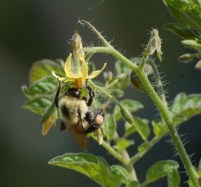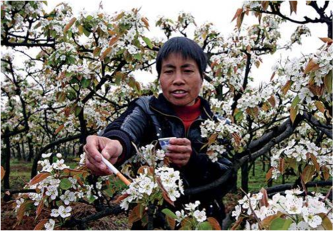
Global Decline of Insect Pollinators Threatens the Human Food Supply
By The Editors
An international team of 40 scientists (from 27 institutions involved in the UK’s Insect Pollinators Initiative) reports that pollinating insects, essential to the food supply, are threatened at a global level by a “cocktail” of multiple pressures that puts their survival at risk. The findings were published April 22 in the journal “Frontiers in Ecology and the Environment” (Adam J Vanbergen, and the Insect Pollinators Initiative. 2013. Threats to an ecosystem service: pressures on pollinators).
The multiple pressures within the “cocktail” combine and exacerbate the negative impacts on insect pollinators of crops and wild plants.
What are these multiple pressures? Intensification of land-use, climate change, the spread of species that are not native to the ecosystem, lack of food sources, diseases and pesticides.
Possible solutions are complex, but taking immediate action is necessary to avoid bigger problems in the future. Let’s not forget the farmers of Maoxian county in the Chinese province of Sichuan. They lost most pollinators through indiscriminate use of pesticides and, for the past few decades, these farmers have been hand-pollinating apple and pear flowers with pollination sticks made of chicken feathers and cigarette filters (see picture below).
Is hand pollination efficient? Is it sustainable? Can human bees replace honeybees? We all know the answer to these questions.







4 Comments
bcastro3
As everyone know, the human population is expected to continue rising in the upcoming years as the food supply for humans gets shorter and shorter. It makes everything more difficult when natural pollinators that we need in order for food products to naturally grow have been or will completely disappear soon. luckily new techniques have been used such as hand pollination but eventually this will not be enough for the demand needed. Although there is more than one reason to why the natural pollinators have been disappearing, pesticides are the culprit in some cases. Saying that, not everyone understands how bad the uses of pesticides are for our environment. Pesticides are usually used to kill unwanted animals, rodents, weeds etc but a new product has to be developed in order for these pesticides to kill the target but not the animals that benefit the production of our crops.
Jbruno1
When humans have exhausted all other options, they are forced to take up tasks until conditions can be restored. As a result, of the disappearance of various key pollinators they have to pollinate vegetation for themselves. This hand-pollinating technique may be useful for a short period of time but they do not compare to the organisms that thrive on this process. The bees and insects are vastly more efficient have an innate understanding of the pollination process. The Human influenced pollination technique can never replace the original pollinators.
ErinnGoBragh
Hand-pollinating? That’s absurd. It is completely inefficient. It would probably take that man in the picture days just to finish pollinating one tree. People think that insects are a burden and just want to get rid of them but they are essental. Humans can’t do everything on this earth, we need to stop using pesticides and protect insect pollinators.
FurElise
I knew that the effects of cell phones on bees, which are important in pollination, was becoming a problem, but I was unaware of the other pressures on such insects. A lot of these pressures can be rooted back to the effects from human pollution. For instance, climate change can likely be due to global warming caused by release of harmful greenhouse gases. Other forms of pressure include pesticides. The amount of disadvantages caused by pesticides are increasing. I understand their helpfulness in certain situations, but considering the harm they are causing, is it worth using them as much as they we do? Pressures like these are causing serious problems with pollinating insects. Without them, plants could not survive and neither could we.